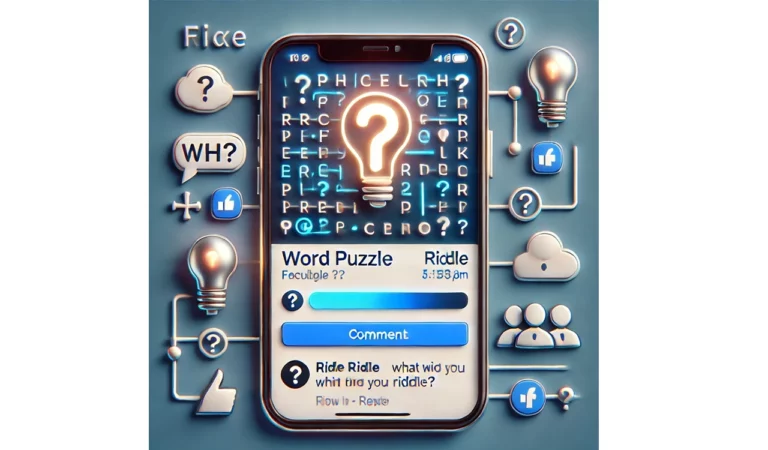Home | Columns | Facebook Word Puzzles How Simple Riddles Captivate And Challenge Users Facebook word puzzles: How simple riddles captivate and challenge users Facebook's viral word puzzles engage users with their clever simplicity, challenging overthinking and offering a mental escape. From tricky riddles like ‘What has four letters’ to classics like ‘I speak without a mouth,’ these brain-teasers spark social interaction and remind us of the joy in language's playful elegance By Telangana Today Published Date - 22 August 2024, 04:27 PM Facebook puzzles are most popular among those interested in language By P Nagarjuna Rao In today’s digital age, social media platforms like Facebook have become a hub for more than just sharing life updates and connecting with friends. They’ve also emerged as spaces where our minds are constantly challenged by clever puzzles and word games, often in the form of brain-teasing posts that go viral within hours.
One such intriguing teaser recently appeared in the popular ‘Mind Your Language’ Facebook group: Also Read Facebook: Still the king of weird debates and ice cream name fights What has four letters, sometimes nine letters, but never has five letters. At first glance, this puzzle seems like it could be a riddle with a hidden, complex solution. The phrase teases your brain, tempting you to think of some mysterious object or concept that fits the description.

But for those with a keen eye and a love for wordplay, the answer is deceptively simple. The statement isn’t a question at all; it’s a cleverly crafted play on the words themselves. The word “what” indeed has four letters, “sometimes” has nine, and “never” has five.
There’s no hidden meaning — just a straightforward observation. While some quickly grasp the trick, others find it to be a real brain-scratcher. This kind of puzzle plays on our natural tendency to overthink, leading many to search for an answer far more complex than necessary.
Yet, the joy of solving such puzzles lies precisely in this simplicity — the realisation that the solution was staring you in the face all along. These wordplay puzzles are not isolated to one group or post. Facebook is filled with similar brainteasers that prompt users to pause, think, and then delight in the simplicity of the answer.
Below are a few more examples that have baffled and amused Facebook users, especially in groups like “Mind Your Language” or ‘Riddle Me This’ ‘ The Poor Have It, The Rich Need It, And If You Eat It You Die. What Is It?’ This classic riddle has been circulating on social media for years, and it never fails to stump some people. The answer? “Nothing.
” The poor have nothing, the rich need nothing, and if you eat nothing, you die. It’s another brilliant example of how word puzzles can lead you down a complex thought path, only to reveal a simple truth at the end. ‘I Speak Without a Mouth and Hear Without Ears.
I Have No Body, But I Come Alive With the Wind. What Am I? ’ This riddle taps into more abstract thinking. The answer is ‘an echo’.
An echo, of course, fits all the criteria—it’s a sound that doesn’t need a physical form to exist, yet it comes to life when sound waves bounce off surfaces. Puzzles like this one are especially popular because they require a mix of imagination and logic. ‘What can travel around the world while staying in a corner? ’ This riddle plays on your sense of geography and movement.
The answer? ‘A stamp’. A stamp, affixed to a letter, can indeed travel globally while staying in the corner of the envelope. It’s a fun twist on our understanding of movement and space.
Appeal of wordplay puzzles What makes these puzzles so appealing on platforms like Facebook? Part of it is the social aspect — people love sharing these riddles with friends and watching their reactions. They also spark discussions in the comments, where users band together to dissect the puzzle and sometimes share a collective ‘Aha!’ moment. Moreover, these puzzles provide a brief mental break.
In a world filled with constant news updates and information overload, spending a few minutes on a simple yet challenging riddle can be a refreshing escape. They remind us of the joy of thinking creatively, of looking at words and ideas from a different angle. The role of Facebook group s Facebook groups dedicated to language, wordplay, and riddles are particularly fertile ground for these types of puzzles.
Members of these groups often share and discuss puzzles not just to challenge each other but to appreciate the beauty and cleverness of language. These communities bring together like-minded individuals who enjoy the intricacies of words and the surprising solutions they can yield. In conclusion, the next time you stumble upon a seemingly perplexing puzzle on Facebook, remember: the solution might be simpler than you think.
Whether it’s realising that ‘what has four letters’ is merely a statement of fact or solving a riddle about something as commonplace as a stamp, these wordplay puzzles invite us to appreciate the elegance of language and the joy of shared intellectual challenge. So, keep an eye out for the next brain-teaser that crosses your feed — you might just find yourself pleasantly surprised by the simplicity of the answer. Follow Us : Tags Facebook WhatsApp groups word puzzles wordplay Related News The Case for an Indian-Owned Messaging Platform: Breaking Free from Western Digital Dominance Facebook: Still the king of weird debates and ice cream name fights Editorial: Address privacy concerns India among most active countries for Meta’s Threads globally.



















